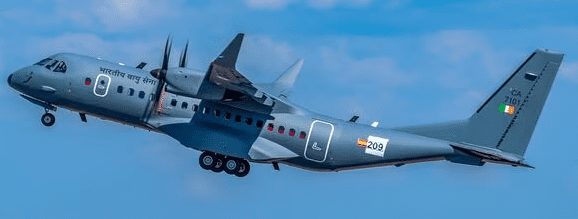
Picture1
Airbus selected Dynamatic Technologies, an Indian company based in Bengaluru, to manufacture and assemble its Airbus 220 family aircraft doors.
Dynamatic Technologies will manufacture and assemble the cargo, passenger, and service doors along with the over-wing emergency exit doors for A220 aircraft. The first set of doors will be shipped out early next year, Udayant Malhoutra, Chief Executive Officer and Managing Director of Dynamatic Technologies, said.
Jyotiraditya M Scindia, the Union Civil Aviation Minister, who was present for the exchanged agreements, said this was the largest Indian export order for aircraft doors. The Minister added that this is the second order for the manufacturer of doors, with Tata Advanced Systems Ltd (TASL) bagging one earlier. Last year, Airbus awarded the contract for manufacturing bulk and cargo doors of the A320 Family to TASL
Terming it a “golden letter day” in India’s civil aviation journey, Scindia said not only does it mark the coming together of the largest aviation manufacturer in the world, Airbus, along with the engineering prowess in India, but it also marks in many ways what has come to be India becoming a destination for aerospace manufacturing across the world.
Malhoutra added that the company has been in business with Airbus for the last 17 years, including making complex mechanical devices like manufacturing the Flap Track Beam of the Airbus A330 and A320 family aircraft. “These require complex mechanical assembly which takes the aircraft up in the air and brings it down safely when it is landing for about 800 aircraft every year,” Malhoutra said.
While declining to get into the value of the current contract, Rémi Maillard, President and Managing Director, Airbus India and South Asia, said that Airbus currently procures goods and services worth $750 million annually from India, which will touch $1.5 billion in the coming years.
Final Assembly Line:
The Union Minister said two approaches are followed worldwide regarding having a FAL in India. One is the bottom-up approach, where you start ancillary product lines and parts and slowly build yourself up to a FAL. The other approach is to go and put the FAL in on day one and develop the ecosystem around it.

“In India, we are following both approaches. There is a bottom-up approach of development of technology, capability, industrial engineering, computer science—CAD, CAM development and there is a top down approach where you have seen the C295 aircraft FAL facility where 40 out of 56 aircraft will be made in India as well as the H125 helicopters. Suffice it to say that in the last decade, you have seen a paradigm shift in India’s capabilities from just being a product and software supplier to becoming a really value added supplier that is really demonstrated in her capability of producing fuselage for the Apache helicopters Empennage for the C130J Hercules complex tail fin structures for the Boeing 737. You have Indian and international companies coming and doing all the electrical wire harnesses for aeroplanes, seat harnesses, emergency chutes being made in India. There is a tremendous synergy happening from both a bottom up and top-down perspective. It comes from the complex engineering which goes into building the aircraft. Today there is not a single Airbus aircraft which is built which does not have an Indian part, equipment or product that is used in it. Therefore, we are well and truly on our way to becoming an aerospace player,” he said.
It’s time for Airbus to consider establishing a FAL in India.
Views: 3




